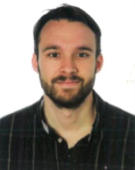You are here :
- EUTOPIA website
- Home
- Research & Innovation
- Fellowship
- SIF - Post-Doctoral Fellowships
Gonzalo Ortiz Álvarez, Pompeu Fabra University Barcelona

Curriculum Vitae
Gonzalo Ortiz Álvarez, PhD
- Education
15/09/2009 - 17/06/2013 - Bachelor’s of Science. Degree in Biotechnology at the Pablo de Olavide University, Seville, Spain.
07/10/2013 - 15/09/2015 - Master’s of Science. International Master’s Program Molecular Medicine at the Charité University Medical School, Berlin, Germany.
15/09/2015 - 04/09/2020 - PhD. International PhD Program Labex Memolife at the École Normale Supérieure (Paris Sciences et Lettres University), Paris, France.
Funded by International PhD Program Labex Memolife.
- Experience
07/08/2020-28/02/2021 - Postdoctoral fellow at the thesis laboratory.
01/03/2021-present - Postdoctoral fellow. at Pompeu Fabra University, Barcelona, Spain.
Funded by EUTOPIA SIF Fellowships (Marie Skłodowska Curie Actions Cofund).
- Publications
Ortiz-Álvarez G et al. (2019). Neuron 102, 159-172.
Ortiz-Álvarez G and Spassky N (2021). Current Opinion in Neurobiology 66, 186-194.
Dahlet T et al. (2021). Nature Communications 12(1):3582.
Most relevant congresses and oral communications:
Shaping Life 2. Société Française de Biologie du Développement. 04/2021. Oral presentation.
17th BSCB GenSoc UK Cilia Network e-symposium. 12/2020. Oral presentation.
Workshops Current Trends in Biomedicine at the Universidad Internacional de Andalucía. 11/2019. Oral and poster presentation.
European Developmental Biology Congress. 10/2019. Poster presentation.
Third International Meeting Building the Cell. 09/2018. Poster presentation.
Sixteenth meeting of the Neural Network Development Club. 06/2018. Oral presentation.
Research Project:
Study of the Clonal 4D Dynamics in the Hindbrain and its Regulating Mechanisms: Balancing Proliferation and Differentiation
The development of the brain is a highly regulated process that requires a precise balance between proliferation and differentiation, in order to generate the correct number and types of cells to maintain its cognitive, sensory, and motor functions. The hindbrain, the caudalmost and most evolutionary conserved brain vesicle among vertebrates, is responsible for vital roles, such as respiration, circulation, or motor coordination. The knowledge of how the hindbrain acquires its final functional structure and size entails the study of clonal dynamics, this is the biological behaviour of all the cells issued from a common progenitor. This assessment includes parameters such as proliferation rate and neuronal output of progenitors, cell division pattern, overall migration, and final location of differentiating cells, as well as spatiotemporal changes in proliferation and differentiation. Due to the myriad number of progenitors and differentiated cells, clonal analysis techniques require the implementation of automatic detection, segmentation, and tracking algorithms that help deal with the extensive volume of data and reduce the error-prone bias of the human eye.
This project will involve the elaboration of an unprecedented high scale map of neural development, based on time-lapse microscopy and clonal analysis of spatially-segregated neurogenic populations in the zebrafish developing hindbrain, with time as a crucial parameter (4D-NEUROLINEAGE). It will also entail the development of Machine Learning tools to assess cell behaviours and transitions during brain morphogenesis. Finally, the ontogeny of cell lineages, as well as the study of the molecular mechanisms that generate them, from an – OMICS perspective (RNAseq and ATACseq), is of outermost importance for the development of therapeutic approaches to treat neurodegenerative diseases. Since we know now that the brain is a plastic organ, with very different cells generated from common progenitors at various time points, including adult life, the elucidation of these developmental pathways will be of crucial relevance in matters of public health.


